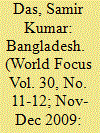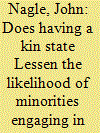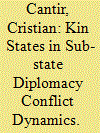| Srl | Item |
| 1 |
ID:
093324


|
|
|
| 2 |
ID:
122815


|
|
|
|
|
| Publication |
2013.
|
| Summary/Abstract |
Existing research has demonstrated that the ability of secessionist movements to mobilize is highly contingent on assistance from external actors, especially via transborder ethnic ties. The specific relationship between kin state and kin group is seen as particularly enhancing to opportunities for secessionism/irredentism. Yet, the analysis of data (1989-2011) does not support this claim. Relatively few groups with kin states have engaged in violent secessionism, and these examples are mostly restricted to successor states from Yugoslavia and the Soviet Union. Thus, this article argues that there are a number of reasons why the relationship between kin state and group increasingly engenders moderation. These reasons are the following: the failure of irredentism as a policy and idea; the asymmetric and problematic relations between kin state and group; and the protective capacity and the provision of resources by the kin state. As such, while external help is vital for secessionist groups to successfully mobilize, kin states typically provide assistance that fosters restraint and peace among their kin.
|
|
|
|
|
|
|
|
|
|
|
|
|
|
|
|
| 3 |
ID:
171780


|
|
|
|
|
| Summary/Abstract |
How and why do diplomatic activities by sub-state units produce conflict with the central government? To answer this question, scholars have focused on multinational states in which at least one administrative unit—Catalonia, for instance—has an identity that is different from the rest of the country. Such noncentral governments (NCGs), the argument goes, are more likely to engage in uncoordinated bypassing activities and in the international projection of their specific identity in a manner that antagonizes central decision makers. That is especially the case if local elites are dissatisfied with the amount of local autonomy and the institutional tools available for identity protection. This article uses insights from the ethnic conflict and nationalism literature to advance sub-state diplomacy scholarship by adding a transnational dimension to the analysis. Three illustrative case studies—France-Canada-Quebec, Austria-Italy–South Tyrol, and Sweden-Finland–the Åland Islands—reveal that kin states can play a variety of roles in the triangular relationship with the kin NCG and the host state and can either exacerbate or dampen conflictual paradiplomacy. More broadly, the article is an effort to conceptualize the role of sovereign states in sub-state diplomacy.
|
|
|
|
|
|
|
|
|
|
|
|
|
|
|
|